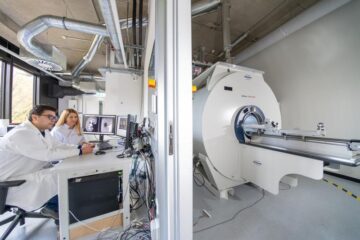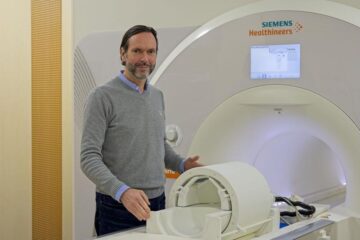UCI scientist will lead NASA effort to overcome physical impact of space travel

Research will aid International Space Station, manned Mars exploration efforts
UC Irvine scientist Kenneth Baldwin has been reappointed by the NASA National Space Biomedical Research Institute to lead a research effort that ultimately will help astronauts stay healthy in space for a year or longer – enough time to conduct a manned mission to Mars.
As leader of the Muscle Alterations and Atrophy Team, Baldwin heads a group of scientists charged with learning why muscles atrophy and lose their functional capacity in the gravity-free environment of space and identifying ways to prevent these harmful changes from happening. The scientists, who come from institutions such as UCI, Harvard University and UCLA, also will design exercise equipment and programs to keep astronauts from weakening while traveling through space.
Discoveries by the team also will help people work for months at a time on the International Space Station.
Baldwin’s appointment is for four years. He will oversee a program with approximately $2.5 million in annual funding to deliver some milestones designed to enhance the new NASA Space Exploration Initiative put forward by President George W. Bush.
“If we truly want to send humans to Mars, we need to address the physiological problems extended space travel presents,” said Baldwin, a professor of biophysics and physiology. “Research funded by the institute will play a key role with overcoming the physical limits astronauts currently face.”
In addition, Baldwin and Vince Caiozzo, an associate professor of orthopedics, each received approximately $1.2 million in grant funding from the National Space Biomedical Research Institute. Baldwin will use the new funds to develop exercise programs that astronauts can do to stem muscle atrophy, while Caiozzo will continue work with a “space cycle” he and Baldwin helped build to create resistance training programs to maintain muscle strength in the back and legs.
In the ’90s, Baldwin, Caiozzo and Dr. Art Kreitenberg of the UCI College of Medicine developed a prototype cycle – a “space cycle” – to be used on the International Space Station. The bike whirls the cycling astronaut around, creating a miniature form of gravity and providing resistance-training exercise. The new funding will allow Baldwin and Caiozzo to resume using this innovative cycle to create exercise programs for astronauts.
About the University of California, Irvine: The University of California, Irvine is a top-ranked public university dedicated to research, scholarship and community. Founded in 1965, UCI is among the fastest-growing University of California campuses, with approximately 24,000 undergraduate and graduate students and about 1,300 faculty members. The third-largest employer in dynamic Orange County, UCI contributes an annual economic impact of $3 billion.
Media Contact
Weitere Informationen:
http://today.uci.edu/news/release_detail.asp?key=1158Alle Nachrichten aus der Kategorie: Interdisziplinäre Forschung
Aktuelle Meldungen und Entwicklungen aus fächer- und disziplinenübergreifender Forschung.
Der innovations-report bietet Ihnen hierzu interessante Berichte und Artikel, unter anderem zu den Teilbereichen: Mikrosystemforschung, Emotionsforschung, Zukunftsforschung und Stratosphärenforschung.
Neueste Beiträge

Diamantstaub leuchtet hell in Magnetresonanztomographie
Mögliche Alternative zum weit verbreiteten Kontrastmittel Gadolinium. Eine unerwartete Entdeckung machte eine Wissenschaftlerin des Max-Planck-Instituts für Intelligente Systeme in Stuttgart: Nanometerkleine Diamantpartikel, die eigentlich für einen ganz anderen Zweck bestimmt…

Neue Spule für 7-Tesla MRT | Kopf und Hals gleichzeitig darstellen
Die Magnetresonanztomographie (MRT) ermöglicht detaillierte Einblicke in den Körper. Vor allem die Ultrahochfeld-Bildgebung mit Magnetfeldstärken von 7 Tesla und höher macht feinste anatomische Strukturen und funktionelle Prozesse sichtbar. Doch alleine…

Hybrid-Energiespeichersystem für moderne Energienetze
Projekt HyFlow: Leistungsfähiges, nachhaltiges und kostengünstiges Hybrid-Energiespeichersystem für moderne Energienetze. In drei Jahren Forschungsarbeit hat das Konsortium des EU-Projekts HyFlow ein extrem leistungsfähiges, nachhaltiges und kostengünstiges Hybrid-Energiespeichersystem entwickelt, das einen…





















